What's different about our trailers AXLES & SPRINGS |
|||||
 |
|||||
| Spring Axle | 2 spring axles together for a tandem. | Torsion Axle | |||
 An
axle is nothing but a piece of steel with a spindle and mounting plate
welded to it. An
axle is nothing but a piece of steel with a spindle and mounting plate
welded to it. Trailer companies seldom touting the quality of their axles. There isn’t much to say, except the carrying capacity. The quality story lies in the bearings and the hubs. Hubs are rated by their carrying capacity and have to meet certain Department of Transportation requirements. An axle with imported hubs and bearings (most are imported) will do what it’s supposed to do and it’s certified by the DOT. The certification of the axle is important because it helps establish capacity. Pontoon trailer axles are generally 2500, 2700 lb. or 3500 lb. The price spread is negligible, only $10-$20. But like so many things in trailers some manufacturers buy the cheapest kind. WE USE ONLY 3500 LB AXLES. |
|||||
 | |||||
| Properly matched springs carry your pontoon smoothly on good roads and help take the bounce out on the rough ones. Fishing boat trailers may have only two springs. Most pontoon trailers will have four and heavy duty trailers have five. The heavier you pontoon the more leaf springs you should have. Trailer manufacturers that don’t use 3500 lb. axles, usually don’t state what their axle capacity. But it’s usually stamped somewhere on the axle. The trailer owner should be aware of the carrying capacity. A axle with a 2700 lb. axle matched with a trailer that weighs about 600 lb. means the pontoon trailer can carry about 2100 lb. Most modern pontoon pontoons with a medium, sized engine are about 2500 lbs. | |||||
 We
do NOT recommend trailers with adjustable axles We
do NOT recommend trailers with adjustable axlesAdjustable axles are a benefit to a distributor. They allow the manufacturer to ship more trailers on a semi. It’s up to the distributor/dealer to put them on straight. In theory they can be moved for a perfect fit, but no one ever moves them. They can be moved by impact, a pot hole, clipping a curb, etc. If you have a trailer with adjustable axles, check the alignment often. |
|||||
|
|
|||||
| ACCESSORIES | |||||
 |
 |
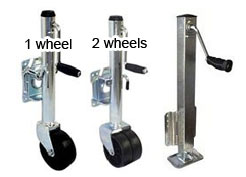 |
|||
|
Manufacturers equip their trailer with common parts that they don’t make.
Tongue jacks, front loading winches, and bunk carpeting are a few. When
buying a new trailer people seldom think about these components, and because
of this, many manufacturers use the cheapest possible parts. Single wheel tongue jacks cost the manufacturer about $20. Dual wheel tongue jacks cost about $50. You’ll find single wheel jacks on most trailers, even big heavy ones. The replacement, when the cheap one breaks, will cost you $50. Front loading winches with capacities ranging from 1000 to 1500 lbs. cost the manufacturer about $20. Big heavy duty front loading winches cost $75. You’ll pay $40 to replace the cheap winch when it fails. Some manufacturers use cheap felt-style carpet that will rip in just a few launchings. The cheap stuff is only pennies less than the good stuff but it doesn’t matter to some manufacturers. We use rubber-backed carpeting that last much longer. Large manufacturers with well know names are no guarantee of quality. They use small winches, tongue jacks and felt carpet on their 800 lb. fishing boat trailers, then use the same components on pontoon trailers. If you don’t pay attention to these parts, you’ll be the one paying $100+ to replace them in a year or two. |
|||||
|
|
|||||
| OPTIONS | |||||
|
We are a pontoon trailer manufacturer, not a fishing boat trailer company that
makes pontoon trailers. We have a full line of optional accessories to enhance your trailering experience. |
|||||
 |
 |
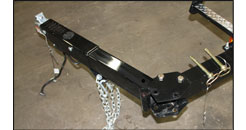 |
|||
|
Stern extensions for tripple tube boats with protruding center tubes. |
Plastic bunk wrap replaces carpet for long life and easy launching in shallow water. |
Swing away tongues for tight storage situations. |
|||
 |
|||||
| Our dress up kit adds aluminum tread plate on the frame and fenders. Add aluminum wheels and you’ve got the custom look without the high price. | |||||
  Our
load guides aren’t that different from others but our trailers have a big
benefit. Because there are multiple cross members in the back of the frame you
can move guides forward for steep ramps. Our
load guides aren’t that different from others but our trailers have a big
benefit. Because there are multiple cross members in the back of the frame you
can move guides forward for steep ramps.Load guides on competing brands don’t work because they are under water. |
|||||
|
|
|||||
| Optional BRAKES Stop your boat. | |||||
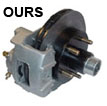  OUR
trailers with optional brakes have disc brakes. OUR
trailers with optional brakes have disc brakes.We sold the old fashion drum brakes for 20 years. They need yearly maintenance, but no one ever services them. Cars haven’t had drum brakes in 15 years, but some trailer companies still use them. Disc brakes stop faster, operate cooler, and have less moving parts to corrode and wear. Disc Brakes are modern technology. | |||||
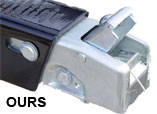 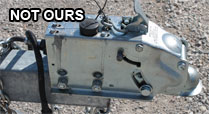 OUR
trailers with optional brakes have the modern OUR
trailers with optional brakes have the modernconcealed coupler for a sharper appearance. The concealed coupler costs a few dollars more than the old fashioned bolt on brake actuator. It’s widely used on “custom” trailers. We make it standard because if you sell your trailer in a few years it will still be modern technology. | |||||
|
|
|||||
| BIG HEAVY BOATS NEED A GOOD TRAILER | |||||
 |
 We are the BIG Boat Specialist |
 | |||
| If you’ve got a big modern pontoon, many of which weigh 6000+ lb., you must pay attention to the trailer you’re buying. Many small manufacturers that build 20’ single axle trailers offer ones for big pontoons and most of them are junk. A small steel fab shop can make an adequate trailer for a 20’ pontoon with a 25 HP engine, but you had better know what your doing on a trailer for a 27’ 7000 lb. pontoon. If you’ve spent $50,000+ for a pontoon boat don’t be tempted to save a few hundred dollars on a trailer. Our heavy duty tandem axle models with 14” tires have capacities up to 6000 lb. and triple axle models have a capacity up to 8500 lb. If you buy a trailer from us with 8500 lb. capacity we give you an 8500 lb. brake actuator (not a 5000 lb. actuator). We’ll give you a 3200 lb. front loading winch (not a 1200-1600 lb.). We’ll provide you with a frame strong enough to transport your boat anywhere you want to go. Michigan to Florida or Arizona, no problem. | |||||
 | |||||
|
|
|||||
| A Few Words About Competition | |||||
|
Throughout this web site we’ve tried to show you what you’re getting
with our trailers. | |||||
|
You may have difficulty making comparisons. Few companies publish much
information about the features of their trailers or even have a sales
brochure. Quality marine dealers sell our trailers and our web site will
help you understand what your getting. You take your chances with others
with competitive brands. You may not know what your getting until after the
financing is done and you pick up the boat on a trailer. Large national companies that enjoy a good reputations often build pontoon trailers. But just because they build a great trailers for 30’ fiberglass cruiser or a PWC doesn’t mean that their pontoon trailer is well thought out. Small regional manufacturers that build adequate trailers for 18’-22’ pontoons will often build trailers for larger boats and the big boat owner can get in trouble with these. Some manufacturers offer multiple lines of trailers; Yacht Club offers an economy P series, a better PTB series, and a deluxe PB series. A low cost Michigan manufacturer offers an All Pro, All Star and All American series. The manufacture’s name is no assurance that your getting a quality trailer. Without a sales brochure or information on a web site, there is no way of knowing what you’re getting. In the past when pontoons weighed 1500-2000 lbs. almost anything with wheels would work. Modern pontoons are 2500 lb. and some are 5000+ lb. Many trailer builders and sellers assume you won’t be traveling. If you are traveling you really must pay attention to what you’re buying. The salesman at the boat show who told you you’d be fine won’t be anywhere to be found if you have troubles. | |||||
|
What's different about our trailers part 2 - back to part 1 | |||||
For Information Call (877)294-3395 or (574)294-3386 |
|||||
 Trailers for Pontoons
Trailers for Pontoons
For all your Pontoon Trailer Needs!
(800)877-1544 - (574)294-3386
(800)877-1544 - (574)294-3386